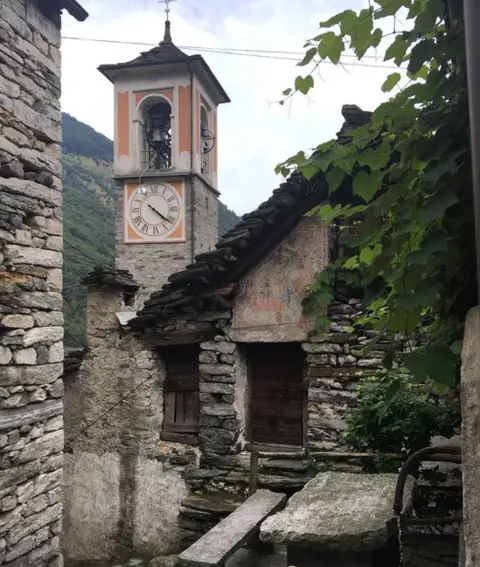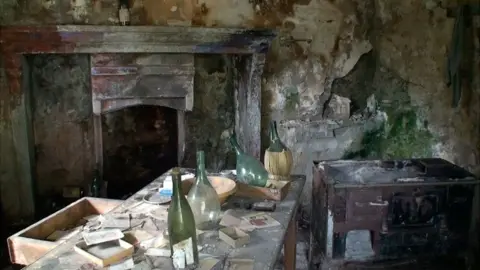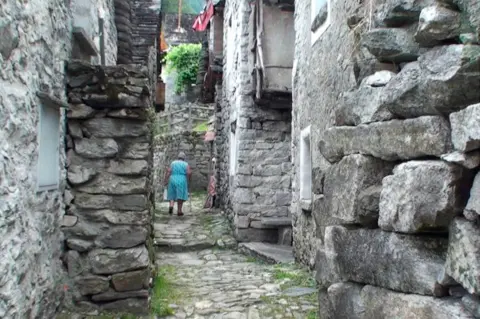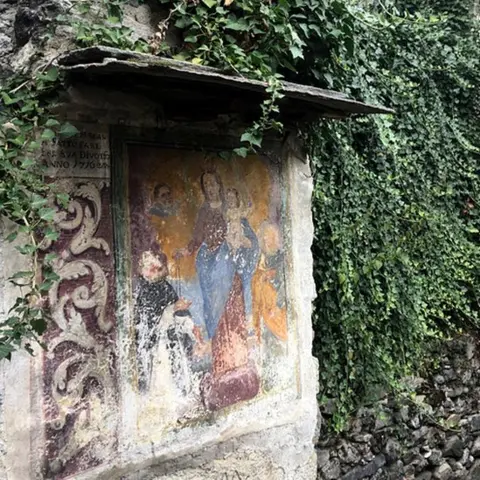Can modern makeover save smallest Swiss village?
Switzerland's smallest village is facing a battle to stay alive.
Like many Alpine communities, Corippo, in the southern canton of Ticino, has experienced decades of depopulation as younger generations moved down to the towns and cities for schooling, work and, understandably, a social life.
Today, Corippo's struggle has become existential, as Mayor Claudio Scettrini explains.
"There are only 16 residents," he sighs. "And I'm the only one going to work, the rest of them are pensioners."
"I hope the rest of them live into their 90s," he continues, "otherwise there will be no-one left here at all. It's really quite tragic."

There has been a community in Corippo for more than 600 years. In the 19th Century the village had 300 inhabitants, and there were many similar villages across the southern Swiss Alps.
No school, no children
Today's popular lakeside resorts of Locarno and Lugano, affectionately known as the "Swiss Riviera", were avoided back then because of the high risk of malaria.
But with malaria eradicated, and traditional mountain farming less and less economically viable, the village way of life has begun to die.
Corippo has no shop, no school and no children. It may be only 30 minutes' drive from bustling Locarno, but the narrow access road, with its hairpin bends, may not be many people's chosen commute.
What Corippo does have, however, are more than 60 traditional stone houses, with dry stone roofs, many of them still with their original fireplaces, and chestnut wood floors. And most of them are empty.

'Authenticity'
Ticino tourism director Elia Frapolli, optimistically perhaps, views this state of affairs as an opportunity.
"Life in Corippo and small villages like this is special," he insists. "It's like being in another century. Time slows down, everybody knows each other in the village, and you feel the authenticity of living in a village that has existed for centuries."
And so, with the support of a foundation devoted to preserving Corippo, a plan has been developed: to turn some of the empty houses into hotel rooms.
The concept, known as albergo diffuso or "scattered hotel", has already been tried in some Italian hill villages, but never in Switzerland.

The entire village of Corippo is now protected as a historic monument, which means architect Fabio Giacomazzi faces a monumental challenge: how to modernise some of the interiors without touching the exteriors.
Abandoned homes
A peek inside some of the houses reveals the scale of his task: many have been untouched since the 1950s, some residents emigrated to the US, others simply died, and no-one was left to clear out the property.
Old clothes, postcards and empty wine bottles litter the floors. The walls are damp and dusty. There is no sign of running water, let alone a flushing toilet.
"Of course we will paint, of course we will put in bathrooms," says Mr Giacomazzi. "But the original doors will stay, the original wood and stone must stay. The experience for guests should be very similar to what it was in the 19th Century in Corippo."
It will be relatively spartan, he admits.
Nevertheless Corippo's 16 residents, from Mayor Scettrini on down, are pinning their hopes on the idea. They are determined their village should not become a theme park. Guests will live side-by-side with villagers, the local bar will be an informal hotel reception, the village square an open-air lobby.
"It's good for the village, for the future, because most of us are old," says elderly resident Silvana. "With this project people will come here."

The few tourists wandering Corippo's empty lanes also seem supportive.
"I think more and more people appreciate this kind of accommodation," says one young man.
"If you want to switch off then I could see it being relaxing for a few days," adds another. "Maybe if you have a book to write or something."

Digital detox
For tourism director Elia Frapolli, a place to switch off completely, to escape from 21st-Century life, is precisely Corippo's attraction.
"This is the perfect place for what we call 'digital detox'," he says.
"It's a new trend. In the 21st Century the new luxury will be authenticity, having a place where you can really feel the history of the place, you can leave your mobile phone behind. This is real, it's not fake, there is hundreds of centuries of history here."
Corippo's plans will take time to achieve, nothing will be ready for at least another year.
But word seems to have got out, and requests for reservations are already coming in.
